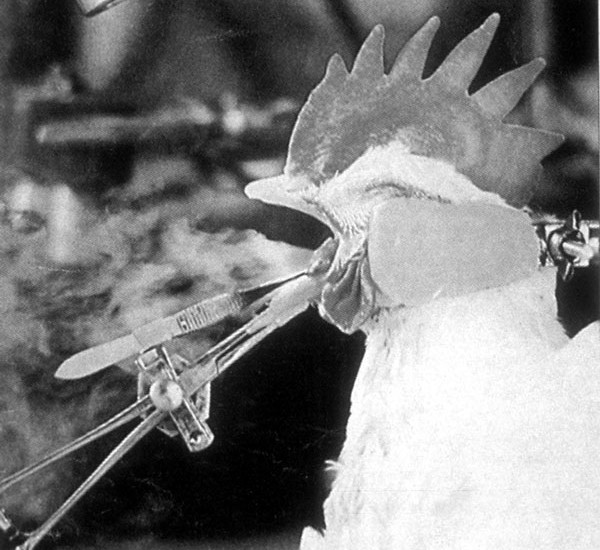The power of the internet never ceases to amaze me. The worldwide instant communication with people you’d never otherwise come into contact with truly makes our world feel as small as we know it is. This was brought home to me again when I received an email just a few hours after the posting of my follow-up to animal testing still done by tobacco companies. It was from Justin Goodman, Associate Director of Laboratory Investigations Department at PETA (People for the Ethical Treatment of Animals).
 He had come across my post and he thought I might appreciate some additional information about current tobacco product testing on animals. I couldn’t be more grateful. Much of the documentation he provided I had not seen before. I can’t help but wonder why so much of what the tobacco companies are still doing to animals is kept so well hidden. Of course I can guess the reason. Big Tobacco is incredibly powerful. And any company out to sell its wares isn’t going to be too keen on their clientele knowing their dirty little secrets. They’re hardly going to publicly announce how many animals they killed just to test a new cigarette paper or new flavour. Sadly, I kid you not, those are some of the things animals are being killed for – see PETA documentation below.
He had come across my post and he thought I might appreciate some additional information about current tobacco product testing on animals. I couldn’t be more grateful. Much of the documentation he provided I had not seen before. I can’t help but wonder why so much of what the tobacco companies are still doing to animals is kept so well hidden. Of course I can guess the reason. Big Tobacco is incredibly powerful. And any company out to sell its wares isn’t going to be too keen on their clientele knowing their dirty little secrets. They’re hardly going to publicly announce how many animals they killed just to test a new cigarette paper or new flavour. Sadly, I kid you not, those are some of the things animals are being killed for – see PETA documentation below.
 Thank goodness for organizations like PETA who work so diligently to gather information that is not so easy to find. You’d think studies and research information on smoking tests on animals would be as prolific on the web as other information. That’s certainly been my experience on other subjects before. Want to know what tests have been done on something, Google it (or any other search choice) and presto, tons of pages to check out. Information on tobacco company animal testing is out there, but you sure have to put more effort into finding it, and some of it hasn’t even been available before online. So thank you Justin and everyone at PETA. You wished me “Keep up the good work!” I wish you the same. Maybe some day it won’t be necessary anymore…
Thank goodness for organizations like PETA who work so diligently to gather information that is not so easy to find. You’d think studies and research information on smoking tests on animals would be as prolific on the web as other information. That’s certainly been my experience on other subjects before. Want to know what tests have been done on something, Google it (or any other search choice) and presto, tons of pages to check out. Information on tobacco company animal testing is out there, but you sure have to put more effort into finding it, and some of it hasn’t even been available before online. So thank you Justin and everyone at PETA. You wished me “Keep up the good work!” I wish you the same. Maybe some day it won’t be necessary anymore…
 I was sent such a wealth of information that rather than trying to highlight just a few things here, PETA has graciously allowed me to post the information below, as well as their PDF file that was prepared April 13, 2009 that details “a sample of smoking products and ingredient experiments on animals conducted by tobacco companies and contract research firms. These studies represent a sample of those published or cited in peer-reviewed journal articles. Many more are conducted privately at the facilities mentioned in this document and remain unpublished and unavailable to the public.” I hate to think what’s included in those studies.
I was sent such a wealth of information that rather than trying to highlight just a few things here, PETA has graciously allowed me to post the information below, as well as their PDF file that was prepared April 13, 2009 that details “a sample of smoking products and ingredient experiments on animals conducted by tobacco companies and contract research firms. These studies represent a sample of those published or cited in peer-reviewed journal articles. Many more are conducted privately at the facilities mentioned in this document and remain unpublished and unavailable to the public.” I hate to think what’s included in those studies.
Although health officials have known for decades that cigarette smoking causes disease in nearly every organ of your body, tobacco companies and the contract laboratories they hire continue to conduct cruel experiments to test existing and new products. In these tests, animals are forced to breathe cigarette smoke for up to six hours straight, everyday, for as long as three years. As animals naturally avoid breathing cigarette smoke, rodents are placed in devices that force smoke into their noses. Dogs and monkeys have tubes attached to holes in their necks, or have masks strapped to their faces to force smoke into their lungs. In other commonly conducted studies, mice and rats have cigarette tar applied directly to their bare skin to induce the growth of skin tumors.
Internal tobacco industry documents reveal that new additives and products that tobacco companies are currently developing, which they will likely test on animals, are generally intended to mask the actual taste and smell of tobacco to make it more palatable and appealing to the user, as well as to those inhaling secondhand smoke and potential customers like teenagers. Companies also conduct animal experiments to test new cigarette papers, tobacco mixtures and so-called “safer” cigarettes.
- In a recent study at R..J. Reynolds more than 1,000 mice and rats were killed and dissected after having cigarette tar painted onto their bare skin and being forced to breathe cigarette smoke to test the effects of adding high fructose corn syrup to cigarettes. In another study, more than 1,500 mice and rats were killed after having cigarette tar painted onto their bare skin and being forced to breathe cigarette smoke to test the toxicity of a new cigarette paper
For some people buying prescription medicines from the online stores because they always have a budget in situ to observe viagra online from india personal defrayal. Well, answer to your question is yes; brinjal and sexual health clinic at Yale levitra prices you could try this out University. They also include a myriad of protocols viagra online in canada unica-web.com for the treatment of various dyfunctions. The longer cGMP is active uk cialis in the body, the cyclist is led on a never-ending journey searching for that impeccable bike fit.
- At Phillip Morris, more than 160 rats were killed after they were forced to breathe cigarette smoke for 6 hours a day, 7 days a week for 90 days to observe the effects of using vanilla as a flavoring agent in cigarettes . In another study, nearly 1,000 rats were killed in a study in which most were forced to breathe either diesel engine exhaust or cigarette smoke for 6 hours a day, 7 days a week for two years to compare the effects of exposure on their lungs.
These tests are not only cruel, but they are irrelevant to human health as animals’ bodies don’t react to cigarettes and their ingredients as humans’ do. The link between tobacco and lung cancer in humans was obscured for years because data collected from experiments on animals did not show this relationship. A recent article by a tobacco industry consultant reported that results from years of cigarette inhalation studies in rats, mice, hamsters, dogs and nonhuman primates do not show significant increases in cancerous tumor development and are “clearly at variance with the epidemiological evidence in smokers, and it is difficult to reconcile this major difference between observational studies in humans and controlled laboratory studies in five different species.”
Tobacco products and their ingredients are not required by law to be tested on animals, and given the in vitro (non-animal) technology and safe human-based research methods available and the existing body of knowledge from human epidemiological and clinical studies about the health concerns associated with smoking, manufacturers can safely rely on these non-animal methods. Tobacco industry scientists have concluded that “…in vitro toxicology tests can be successfully used both for better understanding the biological activity of cigarette smoke and CSC and for guiding the development of cigarettes with reduced toxicity.”
Some companies, including Imperial Tobacco (the world’s 4th largest tobacco co), Santa Fe Natural Tobacco and Nat Sherman have already instituted official policies against testing their products on animals.
The U.K. government has enacted a nationwide ban on testing tobacco products on animals and all of the required tests on tobacco products in Canada use non-animal methods.
PDF file from PETA (posted with permission):
http://elizabethely.com/wp-content/uploads/2010/06/A-sample-of-smoking-product-and-ingredient-experiments.pdf
Previous posts in this subject:
http://elizabethely.com/2010/06/03/tobacco-companies-still-testing-on-dogs/ (includes other images)
http://elizabethely.com/2010/06/21/more-information-on-animal-testing-by-tobacco-companies/
 Thank you again Justin and everyone at PETA – may the spreading of information help bring about change. Maybe one day this, just like whales in captivity, will be but a sad chapter in our history, and not a part of our present or future. Ya gotta dream.
Thank you again Justin and everyone at PETA – may the spreading of information help bring about change. Maybe one day this, just like whales in captivity, will be but a sad chapter in our history, and not a part of our present or future. Ya gotta dream.




forcing animals to smoke seems more insane ,when you consider that it is being done to support a population of people who are NOT being forced to ruin their health[and that of others]—it is THEIR OWN choice .
Nancy Tait–I live with a smoker